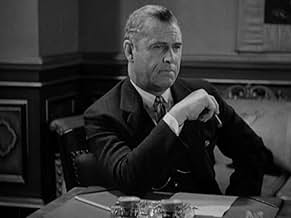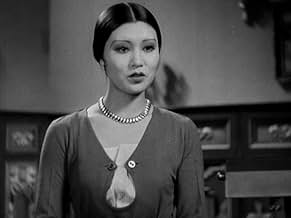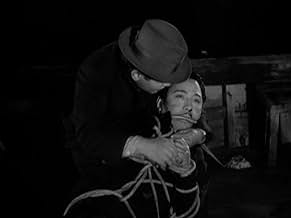A hatchet man is ordered to kill his close friend for the sake of Tong.A hatchet man is ordered to kill his close friend for the sake of Tong.A hatchet man is ordered to kill his close friend for the sake of Tong.
- Director
- Writers
- Stars
- Awards
- 2 wins total
J. Carrol Naish
- Sun Yat Ming
- (as J. Carroll Naish)
Edward Peil Sr.
- Bing Foo
- (as Eddie Piel)
Anna Chang
- Sing Girl
- (uncredited)
Blanche Friderici
- Madame Si-Si
- (uncredited)
Willie Fung
- Notary Fung Loo
- (uncredited)
- …
Anne Howard
- Young Girl
- (uncredited)
Ralph Ince
- 'Big Jim' Malone
- (uncredited)
Otto Lederer
- Pawnbroker
- (uncredited)
James B. Leong
- Tong Member
- (uncredited)
Gladys Lloyd
- Fan Yi
- (uncredited)
- Director
- Writers
- All cast & crew
- Production, box office & more at IMDbPro
Featured reviews
It's every bit as satisfying and punchy as LITTLE CAESER but with a Chinese flavor set during the early 20th century Tong Wars in San Francisco.
Robinson as Wong is a Tong hitman ordered by warlords to kill his best friend and cannot refuse his obligation. He reluctantly does his duty and kills his friend Sun Yat Ming played by J Carroll Naish. Before his death, Ming who knows and accepts his fate asks Wong to marry his young daughter Sun Toya San played by Loretta Young when she grows up. Wong agrees and promises to Ming to do everything in his powers to make her happy for life before executing him.
Later Wong becomes a succesfull business man and powerful Tong member. He marries Sun Toya to keep his promise to his deceased friend. Sun Toya is far younger, immature and likes to party in contrast to the serious Wong. She falls in love with Wong's bodyguard, a handsome young, smooth but not so smart drug dealer named Harry. Played by Leslie Fenton. When Wong discovers the affair he forgoes retribution and sadly lets the two run away together in order to keep his promise to make Sun Toya happy. But he also makes Harry vow a similar oath before Buddha before he lets them go.
The fallout from this is that he loses face with the Tong leadership and is kicked out in disgrace for letting his wife's seducer live. Wong is bankrupted and reduced to working as a farm laborer. In the end Wong, Sun Toya. And Harry end up meeting again at a tea house/brothel in China for a very spectacular and stunning ending.
As was typical of the time all the main characters are played by Caucasians. Robinson is brilliant as Wong and needs little makeup to make him look the part. Young looks like a plastic Chinese doll. Her role would have been perfect for Anna May Wong. This is another first class Precode gem.
Robinson as Wong is a Tong hitman ordered by warlords to kill his best friend and cannot refuse his obligation. He reluctantly does his duty and kills his friend Sun Yat Ming played by J Carroll Naish. Before his death, Ming who knows and accepts his fate asks Wong to marry his young daughter Sun Toya San played by Loretta Young when she grows up. Wong agrees and promises to Ming to do everything in his powers to make her happy for life before executing him.
Later Wong becomes a succesfull business man and powerful Tong member. He marries Sun Toya to keep his promise to his deceased friend. Sun Toya is far younger, immature and likes to party in contrast to the serious Wong. She falls in love with Wong's bodyguard, a handsome young, smooth but not so smart drug dealer named Harry. Played by Leslie Fenton. When Wong discovers the affair he forgoes retribution and sadly lets the two run away together in order to keep his promise to make Sun Toya happy. But he also makes Harry vow a similar oath before Buddha before he lets them go.
The fallout from this is that he loses face with the Tong leadership and is kicked out in disgrace for letting his wife's seducer live. Wong is bankrupted and reduced to working as a farm laborer. In the end Wong, Sun Toya. And Harry end up meeting again at a tea house/brothel in China for a very spectacular and stunning ending.
As was typical of the time all the main characters are played by Caucasians. Robinson is brilliant as Wong and needs little makeup to make him look the part. Young looks like a plastic Chinese doll. Her role would have been perfect for Anna May Wong. This is another first class Precode gem.
This is a Hard-Hitting, Mysterious Looking, Gaudy Movie that Exudes Enough Oriental Charm and Tong Gangsterism to Make it an Oddity Well Worth Seeing. It's a Pre-Code Entry and Therefore has some Welcome Violence and Drug Doings.
Of Course, it Seems a Prerequisite to Mention that the Two Leads Playing Chinese are Not Chinese, but Edward G. Robinson and Loretta Young, both with the Help of Makeup and Silks can Pull this Off.
So with Apologies to the Politically Correct, this is After All a Time Capsule and Cannot be Faulted for being what it is. A Racist Industry Reflecting a Racist Society Without Such Sensitive Concerns, So We have to Make Our Amends in Retrospect.
This is a Gripping Story of Tradition and Circumstance and is a Darn Good Yarn. The Ending is Cutting Edge and the Film has Many Aspects that make it an Interesting Look Back on Hollywood and the Way it Presented Pictures to the Public.
Overall, a Must See for Film and Cultural Historians. The Movie Looks Fantastic and is Shadowy and Sultry, Violent and Seductive.
Of Course, it Seems a Prerequisite to Mention that the Two Leads Playing Chinese are Not Chinese, but Edward G. Robinson and Loretta Young, both with the Help of Makeup and Silks can Pull this Off.
So with Apologies to the Politically Correct, this is After All a Time Capsule and Cannot be Faulted for being what it is. A Racist Industry Reflecting a Racist Society Without Such Sensitive Concerns, So We have to Make Our Amends in Retrospect.
This is a Gripping Story of Tradition and Circumstance and is a Darn Good Yarn. The Ending is Cutting Edge and the Film has Many Aspects that make it an Interesting Look Back on Hollywood and the Way it Presented Pictures to the Public.
Overall, a Must See for Film and Cultural Historians. The Movie Looks Fantastic and is Shadowy and Sultry, Violent and Seductive.
The Hatchet Man (1932)
So burdened with ethnic slandering—most of it "unintentional" at least—this movie is almost impossible to watch fairly. The basic story of inter-clan fighting and murder in the Chinese community (in San Francisco) is meant no doubt to have echoes in Italian mobster killings, and therefore have a wider appeal. But when the main characters are played by very non-Chinese talents (a product of the prejudice in Hollywood at the time), there is a constant woe and disbelief on many levels.
Of course, these problems are exactly why a "student' of early Hollywood should watch this. This is a way to get some sense of the problem these movies present. And there are additional reasons to see this—mainly the two really famous actors of the period doing their best to be Chinese. Edward G. Robinson is of course one of the greats of the era, an odd but searingly talented actor, and he plays well the head of one of the Chinese clans (or tongs). His wife has a smaller role but important —and so Loretta Young, a rising, fresh star, does what she can.
Nothing can redeem all this. The title refers to the violence of the subculture, where the solution for dishonor is death (by hatchet, literally).
There is the simplest of attempts to show how the Chinese were assimilating at the time. In a way the movie shows some shred of real life for the Chinatowns of America. The secondary theme here is love, and a kind of arranged marriage. This conflicts in different ways and Robinson, playing a Westernized immigrant, faces one aspect of this New World he can't quite understand. There are a couple of turns of plot to keep you alert, and a crazy ending worth seeing.
It's great to see Warner Archive put this out there in a clean copy, ready for all our various social biases. Maybe that's why it's worth it on some level. Never mind that it is often stiff and slow. Judge it as you can.
So burdened with ethnic slandering—most of it "unintentional" at least—this movie is almost impossible to watch fairly. The basic story of inter-clan fighting and murder in the Chinese community (in San Francisco) is meant no doubt to have echoes in Italian mobster killings, and therefore have a wider appeal. But when the main characters are played by very non-Chinese talents (a product of the prejudice in Hollywood at the time), there is a constant woe and disbelief on many levels.
Of course, these problems are exactly why a "student' of early Hollywood should watch this. This is a way to get some sense of the problem these movies present. And there are additional reasons to see this—mainly the two really famous actors of the period doing their best to be Chinese. Edward G. Robinson is of course one of the greats of the era, an odd but searingly talented actor, and he plays well the head of one of the Chinese clans (or tongs). His wife has a smaller role but important —and so Loretta Young, a rising, fresh star, does what she can.
Nothing can redeem all this. The title refers to the violence of the subculture, where the solution for dishonor is death (by hatchet, literally).
There is the simplest of attempts to show how the Chinese were assimilating at the time. In a way the movie shows some shred of real life for the Chinatowns of America. The secondary theme here is love, and a kind of arranged marriage. This conflicts in different ways and Robinson, playing a Westernized immigrant, faces one aspect of this New World he can't quite understand. There are a couple of turns of plot to keep you alert, and a crazy ending worth seeing.
It's great to see Warner Archive put this out there in a clean copy, ready for all our various social biases. Maybe that's why it's worth it on some level. Never mind that it is often stiff and slow. Judge it as you can.
Naturally, the casting of Caucasian actors in Asian roles (see also "The Good Earth," "Dragon Seed," Charlie Chan, Mr. Moto, etc.) is a thing of the past. Casting Edward G. Robinson as a Chinese hit man is equivalent to doing a revival of "Flower Drum Song" with Hugh Jackman and Britney Spears. However, the plot of "The Hatchet Man" is well-thought out and surprisingly respectful of Chinese culture in America. Okay, they're killing each other, but is that any worse than, say, "The Godfather" series as relates to Italian-American culture? At least that don't have the Chinese characters saying things like, "Oh, me velly solly." Plus, the ending (which I won't spoil) is absolutely right and decidedly welcome.
10FishIM
Yes as many have stated, by today's standards, the casting of this movie seems ridiculous, but please keep in mind the time period that this movie was made. All things considered, even with the period specific "whites for ethnic minorities" casting mentality, respect for a certain amount of cultural authenticity was in this movie to a greater degree than in previous films of this era, and so I feel that in that respect this movie was ground breaking and helped slowly pave the way for minorities to eventually take center stage in great theatrical releases. Most other films before and since (until the late 70's early 80's) stereotyped Asian characters as clownish and comical to an absolutely racist degree. Not so here. Robinson (although he did use some stereotyping) created a character who was not only mysterious, but both an anti-hero as well as deep & complex the likes of which would not be seen for a great long time after. His acting ability was amazing and truly well showcased here. He was able to show what really made his characters great and not just the mugging gangster stereotype that became so exaggerated over time. Often people forget what a true talent Robinson was, and if you need to know why... See this one if you ever get the chance!!!
Did you know
- TriviaEdward G. Robinson's wife at the time, Gladys Lloyd, appears uncredited as "Fan Yi". They were married from 1927 to 1956 and she would appear in five films with him from 1931-32.
- GoofsWhen Wong Low Get displays the scar on his left arm to the Tong; he places his right arm palm down over his left and pulls back the sleeve. But on the next immediate cut which is a close-up of the arm; he now has his right arm palm up under the left arm.
- Quotes
Wong Low Get: Sometimes it is better that the eye should not see what the hand is doing.
- ConnectionsEdited into Torchy Blane in Chinatown (1939)
- How long is The Hatchet Man?Powered by Alexa
Details
- Release date
- Country of origin
- Languages
- Also known as
- The Honorable Mr. Wong
- Filming locations
- Production company
- See more company credits at IMDbPro
- Runtime
- 1h 14m(74 min)
- Color
- Sound mix
- Aspect ratio
- 1.37 : 1
Contribute to this page
Suggest an edit or add missing content





































